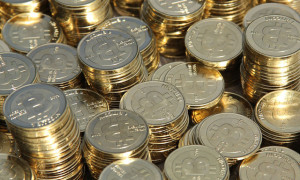On the surface, Bitcoin seems to be a great way to hide cash. Actually, it’s a terrible way to launder money.

That’s the conclusion of a new academic study that analyzed Bitcoin’s blockchain, or the public ledger that records bitcoin transactions. The ledger shows how bitcoins move from one person to another, represented by 34-character alphanumeric addresses.
It’s a sea of numbers without names. But researchers from the University of California at San Diego and George Mason University found it is a lot harder to convert bitcoins to cash — or spend the bitcoins with a service – and stay anonymous due to the ledger.
Most bitcoin users interact with a service to buy or sell the virtual currency. These days, most of those services want to know exactly who they’re dealing with, especially as regulators around the world take an increasing interest in bitcoin.
Using special algorithms, the researchers were able to associate large numbers of seemingly anonymous bitcoins addresses with certain major services such as exchanges and payment processors, said Sarah Meiklejohn, a doctoral candidate in computer science at UC San Diego, who assisted in the research.
By analyzing those transactions, they found it is possible to somewhat deanonymize bitcoin users, opening up avenues through which investigators could reveal the people behind them.
For example, they linked more than 500,000 Bitcoin addresses with Mt. Gox, a popular exchange in Japan where users buy and sell bitcoins. Mt. Gox requires identification from its users, often including a scan of their passport. It wouldn’t make sense for a hacker to cash out a large number of bitcoins there.
“We haven’t uncovered the identity of the thief, but we’ve paved the way for law enforcement or an agency with subpoena power to do exactly that,” Meiklejohn said.
The researchers analyzed details from bitcoin thefts. While there are sophisticated methods that can be used to cloud whether a bitcoin is indeed still held by a thief, many thieves became lazy after initially moving stolen funds around, Meiklejohn said.
“Maybe thieves and other criminals in the future are going to become a lot more sophisticated, but I think so far, people have not been particularly careful,” she said.
Many bitcoin thefts have remained frozen: The victim saw what address their funds went to, but the funds have never moved, perhaps because the hacker is still mulling how to convert the virtual currency to cash or goods without being noticed.
Average bitcoin users appear to be unaware at how quickly their bitcoin spending could be linked back to them. The Silk Road, an online marketplace of mostly illicit goods, only accepts bitcoin.
“We saw a lot of people deposit into Silk Road directly from their Mt. Gox address,” Meiklejohn said. In those cases, law enforcement would have minimal work to obtain the name of a user if they presented a legal order to Mt. Gox.
Money laundering is not impossible, but it is not particularly attractive with bitcoin. “It seems like an offshore account at this point would be a lot easier,” she said.
Still, as long as bitcoin users are willing to take certain cumbersome steps, such as generating new bitcoin addresses for every transaction, staying off the exchanges and using other evasion techniques such as repeatedly forwarding funds, Bitcoin retains its privacy strengths.
“I do think inherently Bitcoin can provide you with a huge amount of anonymity, but the argument here is you have to work for it,” Meiklejohn said. But most patterns of bitcoin use “indicate most users are falling short.”
Meiklejohn co-authored the paper with Marjori Pomarole, Grant Jordan, Kirill Levchenko, Damon McCoy, Geoffrey M. Voelker and Stefan Savage.





